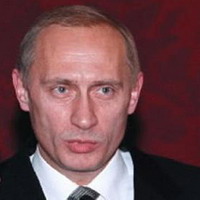Putin promises more social spending

President Vladimir Putin said Thursday that Russia has finally recovered from its precipitous economic fall following the Soviet collapse. He promised billions of dollars to spur on the ambitious social and infrastructure projects undertaken during his tenure.
In his state-of-the-nation speech, the Russian leader said more money had to be put into improving the lives of Russia's citizens, many of whom have been left behind during the crash in the 1990s and the recent oil-fueled economic recovery. Many find themselves with insufficient pensions and unable to afford to move out of deteriorating Soviet housing.
Average incomes had doubled since 2000, he said, and claimed that the country became the world's No. 1 oil producer in 2006.
"Now Russia has not only completely overcome the long fall in its production, but has become one of the 10 largest economies of the world," he told lawmakers and top government officials.
In the seven years of Putin's presidency, analysts estimate that Russia has earned US$750 billion (EUR550 billion) from sales of oil and gas, amid record world prices.
The nation's finance ministry has resisted the temptation to spend that bounty, despite intense pressure from other corners of the Cabinet. Instead, companies' windfall oil profits have been taxed and put into a stabilization fund to cushion any possible price drop as well as to avoid spiking inflation.
But with the country's currency reserves now the world's third largest and the stabilization fund at US$108 billion (EUR79 billion) analysts say Russia is at no risk of an overnight return to the financial doldrums it saw after the default of 1998. Many argue that more state revenues should be used to modernize the economy - large parts of which are still dilapidated or antiquated.
In his speech, Putin made it clear that the time had come to put more of the money into improving the lives of Russia's citizens. He proposed a 250 billion ruble (US$10 billion; EUR7.5 billion) fund to repair housing and resettle residents.
"It is inadmissible for a country with such reserves accumulated from its oil and gas revenues to be at peace with the fact that millions of its citizens live in slums," he said.
To large applause, he suggested that part of the bill could be footed from money raised in the bankruptcy auctions of the OAO Yukos oil company.
The company was brought to its knees in a state-led tax campaign critics said was aimed at silencing its jailed former owner Mikhail Khodorkovsky. For ordinary Russians that might be seen as a just use of the funds: Khodorkovsky was widely reviled in the 1990s as one of many tycoons who parlayed his close ties to power into vast wealth.
After the speech, Sergei Ivanov, first deputy prime minister and a leading contender to succeed Putin once he steps down next year, echoed the call for more social spending.
"At a certain time, an enormous amount of money was stolen from the state. Now this money is returning, and that state has decide to spend it on the most destitute," he said.
Putin said that 100 billion rubles (US$3.9 billion; EUR2.9 billion) should go toward improving Russia's crumbling roads. A thorough overhaul could see the country's gross domestic product boosted by 3 percent, he asserted.
Also well-received was Putin's call for a mechanism that would see the government match every 1,000 rubles (US$39, EUR29) put into citizens' private pension plans. Currently, nearly all retirees receive government pensions.
Lawmaker Gennady Seleznyov, a former Communist and former parliament speaker, warned that Putin's vision was far from the reality and the promises of previous speeches had come to little.
"Economic inequality is growing - growing at a significant pace, from year to year," he said.
Subscribe to Pravda.Ru Telegram channel, Facebook, RSS!




